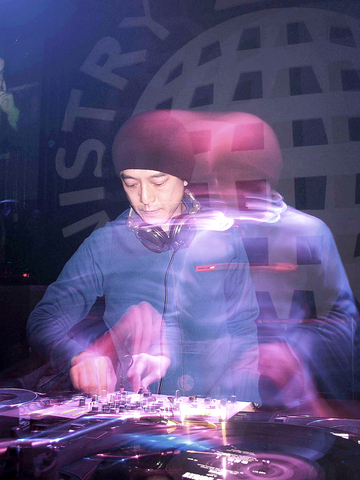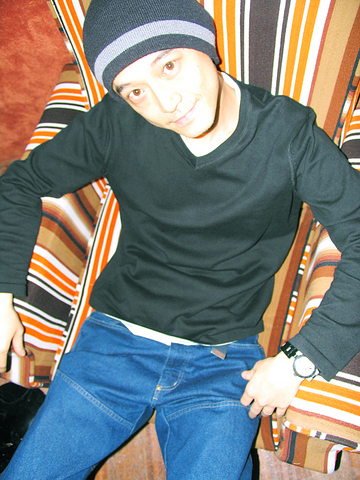In the mix for over 17 years, DJ @llen was instrumental in establishing a dance music scene in Taiwan. Touted as the Godfather of electronic dance music in Taiwan, he's played at the Street Parade in Zurich, Switzerland, and Rio Parade in Rio de Janeiro, Brazil, and has a long list of firsts to his name. Around five months ago he flew the coup and set up shop across the Taiwan Strait. He popped back to promote his new mix CD Electro Groove, released by Hinote Records.
VW: Why did you make the move to China?
A: I went to play at the big love party in Zhuhai last year [for the third time]. A lot of people went

PHOTO COURTESY OF @LLEN
dateline: about 40,000. The music scene in China has progressed a lot, very quickly, more so than Taiwan. Now there are fewer clubs in Taiwan and fewer opportunities to play. China has opened its doors. Economically it's developing very, very quickly. And a friend asked me to be a music director at a new club in Shanghai.
VW: What's happening to the dance music scene in Taiwan?
A: I need to take a break from Taiwan, as it's so frustrating, not just for me but for other DJs. There aren't any places to play anymore, not many parties. It's all hip hop. Now Luxy is dominant. The creativity in Taiwan has changed, it's too static, you have to be famous, you have to make money. People don't have the same attitude as before.

PHOTO: JULES QUARTLY, TAIPEI TIMES
VW: Are Taiwanese and Chinese clubbers brothers in arms, united by music but divided by politics?
A: The clubs are very different. There are two kinds in China; one where just Chinese people go and don't mix with foreigners, not like in Luxy, and the music is too cheesy.
Foreigners tend to go to bars with dance music, where the atmosphere is good and the music is good. At the mainly Chinese, cheesy clubs the DJs play super commercial house.
Chinese people tend to go to clubs in groups, buy a bottle of whisky, drink it with green tea and play dice games. At least 50 percent of the girls in those clubs are prostitutes. There are a few good clubs like TKD, very underground decoration, like the old Texound, minimal, more intimate.
VW: In Taiwan the government has been quite strict on clubs and parties, with high taxes, complex licensing laws and close police scrutiny. How do Chinese authorities treat the dance music scene?
A: Some say that China's government doesn't really care about the party scene or drug use, as it wants young people to have something to do and not think about politics too much. The drugs scene there is huge. I have seen policemen in uniform in private rooms at clubs, partying and using drugs. The police have huge power, to run a bar or club you have to have a really good relationship with them. I don't know why the government in Taiwan is so hard on the youth culture.
VW: How does China's music scene compare to Taiwan's?
A: I think China is about five years behind. The DJs play old tunes. There's not so much information in Chinese about dance music, and the average Chinese person's English abilities aren't as developed as in Taiwan. A few years ago it was all Guangdong trance. Then cheesy house. Now it's more diverse. There's a small market for drum and bass.
VW: Isn't it difficult to find decent records in China?
A: There aren't really any good record shops. I use MP3s most of the time on a new system. It's a digital DJ system. You have two control vinyl decks, and play in the normal way and control the MP3s through the computer. You have turntables and everything, but the decks control the music through the computer. I don't have to carry heavy vinyl records.
VW: Besides lightening the load, which flunkies normally carry anyway, what's the advantage of using this new system?
A: It's much better than vinyl records. It gives me more freedom. I can search for tracks quickly and be more responsive and more versatile. I think people are tired of listening to hours of the same music, so I want to play different styles.
You have to convert your MP3s into a time signal. It's very quick to get used to because it's the same as playing with vinyl. If your computer crashes then that's a problem, but that's not happened to me yet. And I buy MP3s over the Internet. It's easy and quick to get new tracks. The choice is much wider.
VW: And the plug?
A: I came back to promote my CD. I've been working on it for two years. It took so long because the record company had to license the tracks. Actually I mixed it in one session in my bedroom. It's just that the licensing takes a long time.
VW: Is it on sale in Taiwan and China?
A: The CD is in record stores here. High Note has a company in China, but the authorities are holding up the CD's release, and it may take five months [before it is hits the shelves]. There's no standard, it depends on the mood of the censor. Actually the record company said there might be a problem because the CD sleeve says I am the godfather of Taiwan's dance music.
There's two CD's. One is a mix of newer tracks, electro tribal and dark. The other is funky house, with a beach-party vibe for girls and drinking.

One of the biggest sore spots in Taiwan’s historical friendship with the US came in 1979 when US president Jimmy Carter broke off formal diplomatic relations with Taiwan’s Republic of China (ROC) government so that the US could establish relations with the People’s Republic of China (PRC). Taiwan’s derecognition came purely at China’s insistence, and the US took the deal. Retired American diplomat John Tkacik, who for almost decade surrounding that schism, from 1974 to 1982, worked in embassies in Taipei and Beijing and at the Taiwan Desk in Washington DC, recently argued in the Taipei Times that “President Carter’s derecognition

This year will go down in the history books. Taiwan faces enormous turmoil and uncertainty in the coming months. Which political parties are in a good position to handle big changes? All of the main parties are beset with challenges. Taking stock, this column examined the Taiwan People’s Party (TPP) (“Huang Kuo-chang’s choking the life out of the TPP,” May 28, page 12), the Democratic Progressive Party (DPP) (“Challenges amid choppy waters for the DPP,” June 14, page 12) and the Chinese Nationalist Party (KMT) (“KMT struggles to seize opportunities as ‘interesting times’ loom,” June 20, page 11). Times like these can

JUNE 30 to JULY 6 After being routed by the Japanese in the bloody battle of Baguashan (八卦山), Hsu Hsiang (徐驤) and a handful of surviving Hakka fighters sped toward Tainan. There, he would meet with Liu Yung-fu (劉永福), leader of the Black Flag Army who had assumed control of the resisting Republic of Formosa after its president and vice-president fled to China. Hsu, who had been fighting non-stop for over two months from Taoyuan to Changhua, was reportedly injured and exhausted. As the story goes, Liu advised that Hsu take shelter in China to recover and regroup, but Hsu steadfastly

You can tell a lot about a generation from the contents of their cool box: nowadays the barbecue ice bucket is likely to be filled with hard seltzers, non-alcoholic beers and fluorescent BuzzBallz — a particular favorite among Gen Z. Two decades ago, it was WKD, Bacardi Breezers and the odd Smirnoff Ice bobbing in a puddle of melted ice. And while nostalgia may have brought back some alcopops, the new wave of ready-to-drink (RTD) options look and taste noticeably different. It is not just the drinks that have changed, but drinking habits too, driven in part by more health-conscious consumers and